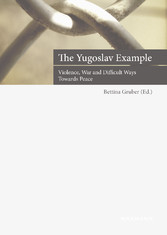Suchen und Finden
Service
book cover
1
Content
4
Between the Past and the Future. Culture of Remembrance, Conflict Transformation, Education
7
History and Perspectives
7
Background of the Publication and its Contributions
10
Conclusion
13
On Trust and Mistrust. The History and Presence of Democracy in Southeastern Europe
15
Historical Promises of Democracy led to Disappointment and the Erosion of Trust
15
In the Labyrinth of the Democratic Transition Era
18
EU Democracy as a Shaky Role Model
21
Authoritarian Dangers in the Balkans
23
Instead of a Conclusion, a Miniature
25
Yugoslavia: A Short Tale of Competition and Cooperation
27
Rise and Fall of the Nationalist Mistake
27
From the Failure of Nationalist Politics to the European Option
31
Common Features as Impulses for Cooperation
36
The Time has not yet Come for All – Short and Long Ways to Reconciliation and Cooperation
37
Déjà-vu?
38
War over Kosovo 24 March 1999 –10 June 1999. Behind and Beyond the Scenes: Why NATO Attacked Yugoslavia
42
Overview
42
Kosovo as a Way for NATO to Raise its Profile
43
US Interests and their Role in the Kosovo Question
45
Germany’s Interests and its Role in the Kosovo Question
47
The EU’s Interests and their Role in the Kosovo Question
49
Neoliberal Economic Interests, Geostrategic and Geopolitical Considerations
51
Tangles of Interests
51
Neoliberal Global Economy as an Engine for War
51
Privatization as a Goal of War
52
Geostrategic and Geopolitical Considerations of the Military
54
Conclusion
55
A European Anti-War Movement. The Response of European Civil Society to the Conflicts in the Former Yugoslavia
60
Introduction
60
The Work at Home: Protest, Advocacy and Direct Aid
61
The Work on the Ground
64
Conclusions
71
Limits to Humanitarian Intervention. Syria and the Lessons from Bosnia and Kosovo
75
Syria and the Balkans – “Wicked Problems”
75
Lessons from Yugoslavia
77
The Dire Consequences of State Collapse
78
Can Intervention Work?
80
Regional Integration in the Age of Globalisation
81
Six Lessons – A Primer for Peace
82
Lesson 1: Negotiate Early and Robustly
82
Lesson 2: Include all Regional Powers – In Particular Iran
82
Lesson 3: No Preconditions about Core Issues
83
Lesson 4: No War Crimes Trials – At Least not Right Away
83
Lesson 5: Be Creative (Ibid.)
84
Lesson 6: Freeze out the Extremists
84
Peace and Security in the Balkans: A Challenge for Europe
86
Educational Factors in the Balkans
87
A Closer Look at the Theme of Religious Diversity
88
Making Peace through Culture
91
E pur si muove!
94
1. Marketplace and Temple
95
2. Polyphony and Counterpoint
96
3. Memory and History
96
Dealing with the Past as a Common Challenge for State Institutions and Civil Society in Bosnia-Herzegovina, Serbia and Croatia
100
Legal Institutions for War Crimes Prosecution – Key Actors in “Dealing with the Past”
102
Governments and State Institutions
103
Civil Society Actors: Grassroots Engagement at a Local and Regional Level
106
The Campaign for Regional Truth Commission (REKOM)
109
Achievements and Challenges
110
Fostering Institutions’ Capacities for Accountability and the Rule of Law
110
The Need for Restorative Approaches
111
Strengthening Civil Society Approaches for Dealing with the Past
112
Building Trust and Relationships in Divided Communities
113
Reconciliation through Recognition
119
Personal Identity Formation – From Hegel to Honneth
120
A New Normative Framework – Reconciliation through Practical “Relations-to-Self”
122
Overcoming Relativization by Countering Abstraction
124
Overcoming Violence: Responding to Contemporary and Past Violence
128
Introductory Remarks
128
I Overcoming Violence
129
Transformative Democracy as the Fundament for Sustainable Peace
129
II Response to Contemporary Violence – How to Find Other Ways?
130
Wartime
130
III Post-War Period – Transitional Justice Measures / Dealing with the Past
133
Dealing with the Past – Transitional (Transformative) Justice
134
Experience from Croatia: Transitional Justice Processes in Croatia (and the Region of Former Yugoslavia)
136
Ongoing Measures and Advances
138
Shortcomings, Gaps and Controversies
143
Go on – But how?
145
IV How to Move Forward?
147
Can the Citizens of Croatia Agree to Reach an Agreement on Croatian-Serbian Friendship?
148
A Few “Easy” Steps towards Reconciliation
151
Concord and Conflict
151
The Development of Teaching Materials to Further Peace
159
Background
159
Early Years
160
Evolution
161
Bottom-up Approach
162
JHP Workbooks
162
Ways and Means
163
Funding and Completion of Workbooks
165
Recognition
167
Human Rights Award 2013
168
Impressions from the Field
168
Montenegro
169
Cyprus
170
Bosnia-Herzegovina
171
Kosovo
171
Albanian an Serbian Minorities – A Crash Test for the JHP
172
The Present and the Future
175
Editor and Contributors
178
Alle Preise verstehen sich inklusive der gesetzlichen MwSt.









